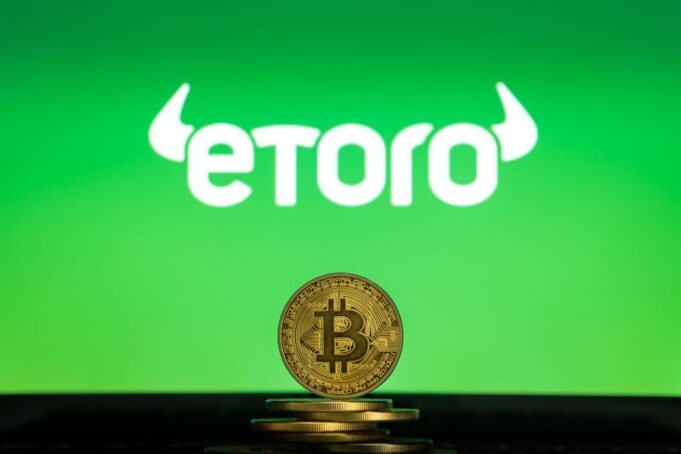In a notable move that signals the tightening of regulatory control over crypto trading, eToro has agreed to a $1.5 million settlement with the U.S. Securities and Exchange Commission (SEC). As part of the settlement, eToro will sharply limit its crypto offerings in the U.S., leaving only Bitcoin (BTC), Ethereum (ETH), and Bitcoin Cash (BCH) available for trading. This action follows charges that eToro operated as an unregistered broker and clearing agency. It allowed U.S. customers to trade assets that the SEC considers securities without proper registration since 2020.
The platform will give its U.S. customers 180 days to sell or transfer any crypto assets not included in the permitted list. Although this restriction impacts only 3% of eToro users by dollar value, it highlights a growing trend of regulatory enforcement. It is forcing crypto platforms to narrow their trading services or face penalties.
A Tightening Regulatory Grip
The SEC has ramped up its scrutiny of the cryptocurrency industry in recent years. It focuses on exchanges and platforms that allow the trading of digital assets considered to be securities under U.S. law. In eToro’s case, the SEC accused the company of offering crypto assets that qualify as investment contracts or securities without registering as required under the Securities Act of 1933. While the settlement does not require eToro to admit or deny the allegations, it effectively restricts the platform’s crypto offerings to just three well-established assets.
The regulatory environment for crypto assets in the U.S. remains in flux. EToro is not the only exchange facing penalties or forced operational changes. Major exchanges like Binance and Coinbase have also been in the regulatory crosshairs, with the SEC aggressively pursuing violations related to unregistered securities trading. These actions are reshaping the landscape for crypto trading in the U.S. It limits access to a wide array of tokens, pushing exchanges toward compliance.
Impact on Users Trading Crypto on eToro
For the 3% of eToro’s U.S. users holding cryptocurrencies beyond BTC, ETH, and BCH, the platform’s new rules mean they must either sell their positions or transfer them to external wallets within the next six months. Although most users will remain unaffected by this change, reducing the assets available on eToro signals a new era of caution in crypto trading. The once-diverse offerings of crypto exchanges in the U.S. are shrinking as regulatory pressure mounts.
Yoni Assia, eToro’s co-founder and CEO, acknowledged the difficulties but emphasized the company’s commitment to adapting to evolving regulations. “This settlement allows us to move forward and focus on providing innovative and relevant products across our diversified U.S. business,” Assia stated.
User Experience and Future Implications
From a user experience perspective, the shrinking availability of tradable crypto assets on eToro could lead to frustration for U.S. customers. These users have previously enjoyed access to a broader range of cryptocurrencies. The narrowing of options may also deter new investors seeking more diverse opportunities within the digital asset space. The SEC’s actions are driven by a desire to protect investors and enforce compliance. As a result, platforms like eToro are left with little choice but to comply with the tight regulatory frameworks.
The broader implications of this case point toward a future where U.S.-based crypto traders have fewer assets to choose from, particularly on platforms that aim to remain within the boundaries of federal law. For the global crypto market, this may serve as a cautionary tale, prompting exchanges to proactively align their services with legal requirements to avoid similar penalties.
>>> Read more: Kraken Under Fire: Is the SEC Overreaching on Crypto?
In the end, eToro’s settlement with the SEC is another example of the U.S. regulatory body’s push to regulate crypto as it would traditional financial securities, making compliance paramount for exchanges that want to operate in the U.S.
Readers’ frequently asked questions
What led the SEC to target eToro and other crypto trading platforms?
The SEC has been increasing its enforcement actions against cryptocurrency platforms in recent years as part of a broader effort to regulate digital assets like securities under U.S. federal law. In eToro’s case, the SEC accused the company of operating as an unregistered broker and clearing agency. It allowed U.S. customers to trade crypto assets that the SEC considers securities but did not adhere to proper registration processes as required by the Securities Act of 1933. The agency’s goal is to protect investors by ensuring platforms comply with securities regulations that mandate disclosure and safeguards similar to traditional financial products. This is part of a wider trend that has also seen platforms like Binance and Coinbase facing similar scrutiny. The SEC tries to bring order to what it sees as an under-regulated market.
How will eToro’s restrictions impact its U.S. customers, and what can they do with their affected assets?
The recent settlement will significantly limit the options for U.S. users on eToro. It reduces tradable cryptocurrencies to just Bitcoin, Ethereum, and Bitcoin Cash. Users holding other digital assets will have 180 days to sell or transfer their holdings to external wallets. However, eToro has assured customers that only a small percentage (about 3%) of users are affected by these restrictions. Users will still have access to a variety of non-crypto investment options, including stocks, ETFs, and options. For those impacted, transferring assets to an external wallet or selling within the designated time frame are the primary courses of action to avoid losing access to their non-supported cryptocurrencies.
What does this settlement mean for the future of cryptocurrency trading in the U.S.?
This settlement, along with similar regulatory actions against other platforms, suggests that the U.S. crypto landscape is undergoing significant change. The SEC is actively defining what constitutes a security in the digital asset space and demanding that platforms register accordingly. For the time being, traders in the U.S. can expect to see fewer cryptocurrencies available for trading on platforms that wish to remain compliant with U.S. laws. However, there is hope that the development of clearer regulations in the U.S., similar to those already in place in Europe and the U.K., will eventually allow platforms like eToro to expand their offerings within a legal framework. Until that happens, crypto exchanges must tread cautiously, limiting their offerings or restructuring their businesses to align with regulatory expectations.
What Is In It For You? Action Items You Might Want to Consider
Evaluate Your Crypto Portfolio and Take Action Soon
If you’re a U.S.-based trader on eToro, now is the time to carefully assess your crypto holdings. With only Bitcoin, Ethereum, and Bitcoin Cash remaining available for trading, you’ll need to decide what to do with any other assets. You have a 180-day window to either sell those tokens or transfer them to an external wallet. Make sure you don’t leave this decision until the last minute to avoid potential issues with liquidity or external wallet compatibility.
Consider Transferring Non-Supported Tokens to External Wallets
If you wish to hold onto cryptocurrencies no longer supported by eToro, transferring them to an external wallet is your best bet. Ensure that your chosen wallet is compatible with your assets and offers adequate security features. This option allows you to maintain ownership without being forced to sell. You also keep your assets safe until clearer U.S. regulations emerge.
Stay Informed About Regulatory Changes in the Crypto Market
As the SEC continues its enforcement actions and the regulatory environment evolves, staying updated on future rulings and platform changes will be crucial. Keep an eye on news from the SEC and your trading platforms to anticipate any new restrictions or opportunities that could impact your trading strategy. By staying proactive, you’ll be able to navigate the changing landscape of U.S. crypto regulation more effectively.











[…] particularly given the company’s history with the U.S. Securities and Exchange Commission (SEC). In September 2024, eToro settled with the SEC over federal securities law violations, leading it to halt trading for nearly all cryptocurrency assets in the U.S. This compliance […]